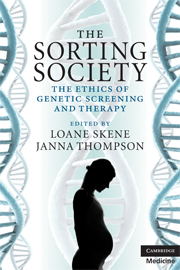Book contents
- Frontmatter
- Contents
- List of contributors
- Preface
- 1 Introduction
- 2 Genetic testing, an informed choice
- 3 Sex selection: sorting sperm as a gateway to the sorting society?
- 4 Cloning to avoid genetic disease
- 5 Procreative Beneficence: reasons to not have disabled children
- 6 Reprogenetic technologies: balancing parental procreative autonomy and social equity and justice
- 7 Genetic technology and intergenerational justice
- 8 Genetic preselection and the moral equality of individuals
- 9 Genes, identity and the ‘expressivist critique’
- 10 Overstating the biological: geneticism and essentialism in social cloning and social sex selection
- 11 The sorting society: a legal perspective
- Index
- References
1 - Introduction
Published online by Cambridge University Press: 16 September 2009
- Frontmatter
- Contents
- List of contributors
- Preface
- 1 Introduction
- 2 Genetic testing, an informed choice
- 3 Sex selection: sorting sperm as a gateway to the sorting society?
- 4 Cloning to avoid genetic disease
- 5 Procreative Beneficence: reasons to not have disabled children
- 6 Reprogenetic technologies: balancing parental procreative autonomy and social equity and justice
- 7 Genetic technology and intergenerational justice
- 8 Genetic preselection and the moral equality of individuals
- 9 Genes, identity and the ‘expressivist critique’
- 10 Overstating the biological: geneticism and essentialism in social cloning and social sex selection
- 11 The sorting society: a legal perspective
- Index
- References
Summary
Techniques are now available to screen fetuses for serious genetic disorders and, in the future, more and better means will be available to determine their susceptibility to disorders of lesser kinds, including those which occur later in life. It is now technically possible for parents to choose the sex of their child. In the future they may be able to choose other genetically carried or influenced characteristics of their offspring: height, body shape, and perhaps even such things as musical talent, intelligence and emotional traits. It is now technically possible to clone sheep and other animals. In the future people may have the option of cloning their offspring. All of these techniques, both existing and imagined in the future, raise concerns about the development of a ‘sorting society’, in which parents are able to choose the children they will – and will not – have. This possibility raises serious ethical, medical and legal issues which are discussed in turn by the authors of this book.
There is widespread support for prenatal tests which give prospective parents the opportunity to find out if their child will have a serious genetic disability, thus giving them the choice of terminating a pregnancy if the fetus is defective. Nevertheless, genetic screening has its critics. Some of these are opponents of abortion who think that even genetically defective fetuses have a right to life. Others worry more about the social implications of screening.
- Type
- Chapter
- Information
- The Sorting SocietyThe Ethics of Genetic Screening and Therapy, pp. 1 - 6Publisher: Cambridge University PressPrint publication year: 2008



